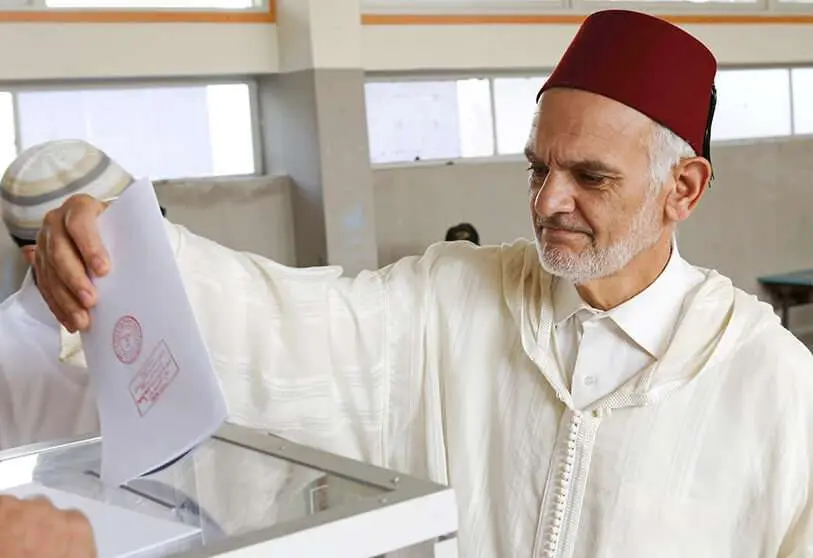Marruecos, a expensas de los resultados electorales tras un discreto aumento de la participación

The polling stations have reopened in Morocco five years later. The scenario this time is radically different, marked by the health crisis and the forced coincidence of a triple vote to choose the representatives of local, regional and parliamentary institutions for the next five years. After the polls closed, the counting of votes began amid complaints from the Justice and Development Party (JDP). The Islamist party has denounced irregularities at the polling stations as it expects to lose representation in the House of Representatives.
The nearly 18 million Moroccans registered and called to the polls seem to have satisfied the institutions, as the turnout registered at 5 p.m. reached 36%, according to the Ministry of the Interior, two points higher than in 2016. The opening of the polling stations went according to plan. Voters were able to go to the polling stations from 7 a.m. onwards, throughout a day that was conducted normally and without any significant incidents, according to the authorities. At midday, the figures showed a turnout of around 12%. Voting ended at 7 p.m., 120 minutes before the curfew still in force in the North African country.
According to Moroccan public television 2M, turnout rose to 52% in the El Alaiun constituency, the main one in Western Sahara, where the historic nationalist Istiqlal Party (PI) mobilised dozens of vans to take voters to the polls. Elsewhere, voter turnout has been influenced by low mobilisation of the Moroccan electorate, caused in part by a generalised state of distrust of the political class. The fact that the elections took place on a working day also had an impact on the voting, but it was nevertheless a historic event. It is the first time that the Alawi kingdom has hosted a triple election.

Those who did exercise their right to vote were the leaders of the different political formations with options to form a government. The Islamist candidate and current prime minister, Saaeddine Othmani, cast his ballot in Salé, a city near Rabat, accompanied by his wife. The leader of the Justice and Development Party (PJD) stressed the importance of the elections and welcomed the number of voters. Othmani is playing to revalidate the post he has held since 2017, when he was appointed by Mohamed VI to replace the charismatic Abdelilah Benkirane.
The main alternative to the Islamist, the tycoon Aziz Akhannouch, voted in Agadir, where he is registered and where he is also running as a candidate to head the National Rally of Independents (RNI). Nizar Baraka, another candidate for the executive, went to the polls in the Riyadh neighbourhood. The new candidate of the Istiqlal Nationalist Party told the media that Morocco is going through an "important stage to tackle the economic and social crisis caused by the coronavirus and the policies of previous governments", while stressing that this appointment is "historic and decisive" to put an end to the "failed" policies, in clear allusion to the PJD, the party that has governed uninterruptedly since 2011.
The names of the 395 members of parliament, 678 regional seats and 31,000 public posts will be decided at the polls. The Islamists are the favourites, but the latest amendments to the electoral law that change the method of counting votes and eliminate the minimum result to obtain representation in the House may take their toll. These are aimed at atomising the parliament. Moreover, not 60 but 90 seats will be reserved for women, although none of the major parties have put forward women candidates. They are all men.

The RNI, a junior partner in the current coalition government, has emerged as the main alternative to unseat the Islamists at the head of the executive. The left-leaning Authenticity and Modernity Party (PAM), which came second in the 2016 elections and whose leader, Abdelatif Ouahbi, voted in the capital, launching a massive appeal to Moroccans to go to the polls, will also be on the list.
The results will be known later this evening at the earliest. However, the most likely scenario is that the count will go on well into the night. In the absence of previous polls or surveys, Morocco will have a government made up of several political forces, which is why it will be necessary to reach agreements and weave alliances to gain access to the cabinet. Whatever happens, the Alawi monarch will decide who will hold the portfolios of Interior, Foreign Affairs, Defence and Islamic Affairs. The remaining posts are still up for grabs.








